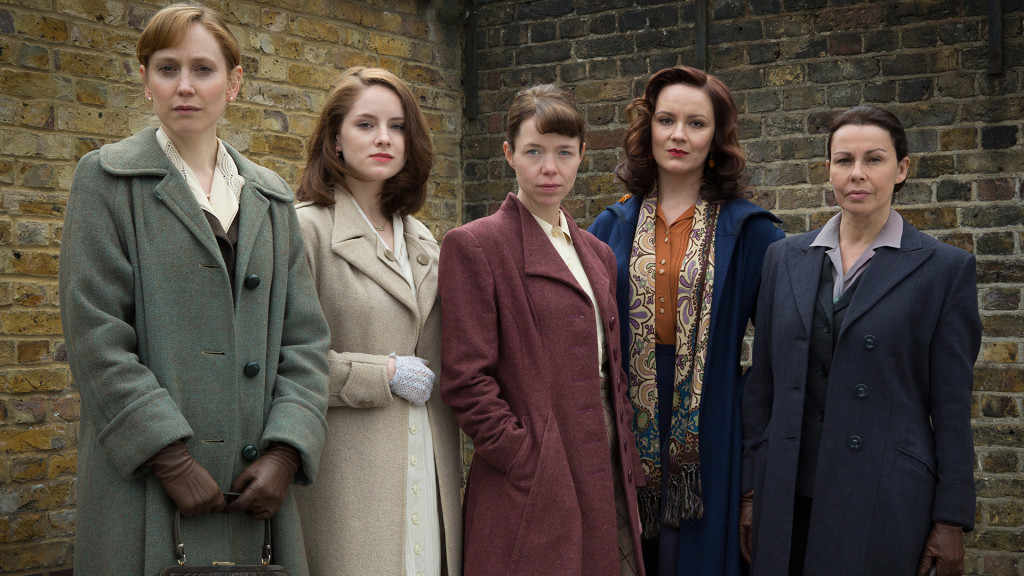“A kinder, gentler time? Hardly.”
 Set in the early 1950’s, this was a brief – seven episodes over two seasons – but very effective TV series, with heroines who used brains, rather than brawn, to solve crimes which the authorities are either unable or unwilling to address. The origins of the group were during World War II, when their analytical skills were put to vital use, cracking German communications, out of the then-secret Bletchley Park base. But after the war, the women returned to normal lives; Susan Gray (Martin) is now married, a mother of two, and uses her talents for nothing more taxing than crosswords. But she is intrigued by a series of serial murders, and detects an apparent pattern in them. When her attempts to through official channels are met with little more than a pat on the head and a suggestion to return to the kitchen, she contacts her colleagues from Bletchley, who begin gathering and analyzing information on their own. This makes use of the skills each has: for instance, Jean (Graham) works as a librarian, while Lucy (Rundle) has a photographic memory, and asks as the group’s computer database.
Set in the early 1950’s, this was a brief – seven episodes over two seasons – but very effective TV series, with heroines who used brains, rather than brawn, to solve crimes which the authorities are either unable or unwilling to address. The origins of the group were during World War II, when their analytical skills were put to vital use, cracking German communications, out of the then-secret Bletchley Park base. But after the war, the women returned to normal lives; Susan Gray (Martin) is now married, a mother of two, and uses her talents for nothing more taxing than crosswords. But she is intrigued by a series of serial murders, and detects an apparent pattern in them. When her attempts to through official channels are met with little more than a pat on the head and a suggestion to return to the kitchen, she contacts her colleagues from Bletchley, who begin gathering and analyzing information on their own. This makes use of the skills each has: for instance, Jean (Graham) works as a librarian, while Lucy (Rundle) has a photographic memory, and asks as the group’s computer database.
There are basically three feature-length stories here. The first takes place over three 45-minute episodes, the others being covered in a pair. After the serial killer case, the group then move on to a case of murder involving another Bletchley Park girl, who is accused – with apparently damning evidence and no denial – of the murder of a scientist. The third story was, for me, the most interesting: one of the circle is involved in slightly-shady black market trades, which brings her into the circle of a vicious organized crime gang, perhaps surprisingly, also led by a woman, Maltese immigrant Marta Magro (Brana Bajic). It becomes apparent they are trading in a good deal more than French perfume and illicit booze – and also have friends in high places, who have no interest in having the highly profitable apple-cart upset by four inquisitive women.
This is a well-constructed look back at a time when women were expected to be seen and not heard, despite significant contributions to the war effort less than a decade previously. If occasionally a bit hand-wavey on the details, it’s also nice to see a series that values pure intelligence; while the physical aspects are limited, that works to the show’s advantage, since you know the heroines have to rely on their wits. There is a certain amount of over-correction in the other direction, with none of the male characters being particularly likable, and certainly nowhere near as smart as the female ones, and in a longer show that could become wearingly one-sided. However, the women are depicted as not without their flaws either. It’s not dissimilar in tone or era to another British show, Call the Midwife, though is much less sentimental and nostalgic; this was a time when food rationing was still in effect, and the nation was still struggling to rebuild itself.
It’s certainly a shame the show was so relatively short-lived, even by the brief standards of UK TV shows. There’s a quality of production here – not just in the period atmosphere, also in the performances – that is all too rare, and its an idea that had almost unlimited potential for future expansion. Refreshingly free of any need for romantic diversions or unresolved sexual tensions (I’m looking at you, Agent Carter), this may be relatively placid compared to some of the entries we cover here, yet is no less worthy for putting mind before muscle.
Creator: Guy Burt
Star: Anna Maxwell Martin. Rachael Stirling, Sophie Rundle, Julie Graham





